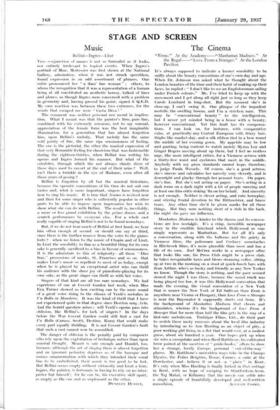Belliniingres—Liszt -
STAGE AND SCREEN
Music
Tuts conjunction of names is not so Surrealist as it looks, nor entirely irrelevant to topical events. When Ingres's portrait of Mme. Moitessier was first shown at the National Gallery, admiration, when it was not struck speechless, found expression in an odd assortment of phrases. One critic pronounced her " a dam' fine woman " ; others, to whom the recognition that it was a representation of a human being at all constituted an aesthetic heresy, talked of lines and planes, as though Ingres were concerned with a problem in geometry and, having proved his point, signed it Q.E.D. My own reaction was between these two extremes, for the words that escaped me were " Pasta Diva! "
The comment was neither personal nor moral in implica- tion. What I meant was that the painter's firm, pure line, combined with his extremely sensuous, not to say sensual, appreciation of the female form was the best imaginable illumination, for a generation that has almost forgotten hint, upon Baines melody. That melody has the same cold purity of line, the same ripe sensuousness of feeling. The one is the pictorial, the other the musical expression of that very Romantic feeling for classicism that was fashionable during the eighteen-thirties, when Bellini was writing his operas and Ingres formed his manner. But what of the tabalellas, through which the not always chaste divas of those days used to cavort at the end of their arias ? Well, isn't there a twinkle in the eye of Madame, even after all those years of posing ?
Bellini is forgotten by all but the musical historians, because the operatic conventions of his time do not suit our tastes and, what is more important, singers have forgotten how to sing his music. It is true that Norma is revived now and then for some singer who is sufficiently- popular in other parts to be able to impose upon impresarios her wish to show what she can do with Bellini. The result is, inevitably, a more or less grand exhibition by the prima donna, and a scratch performance by everyone else. For a whole cast really capable of singing Bellini is not to be found nowadays.
But, if we do not hear much of Bellini at first hand, we hear hint often enough at second -- or should one say at third, since there is the further remove from the voice to the piano- forte ?--- when we listen to the music of Chopin and of Liszt. In Liszt the sensibility to line as a beautiful thing for its own sake is generally sacrificed to a bias in favour of sensuousness.
It is the admixture to this of religiosity—all those " Dies !me," processions of monks, St. Francises and so on--that
makes Liszt's music so repellent to most of us today, except when he is played by an exceptional artist who can thrill his audience with the sheer joy of pianoforte-playing for its own sake, as the great singer can thrill us with her voice.
Singers of that kind arc all too rare nowadays. We had experience of one at Covent Garden last week, when Miss Eva Turner showed us how exciting can be the mere sound of a great voice rising to the climax of Verdi's melodies in Ca Ballo in Masehera. It was the kind of thrill that I have not experienced quite in that degree since Destinn sang Aida.
And the horrid question arises ; will Verdi's operas pass into oblivion, like Bellini's, for lack of singers ? In the days before the War Covent Garden could still find a cast for Un Ballo (Caruso, Scott', Destinn, Kurz) that could make every part equally thrilling. It is not Covent Garden's fault that such a cast cannot now be assembled.
The danger of oblivion is the penalty paid by composers who rely upon the exploitation of technique rather than upon musical thought. Mozart is safe enough and .Handel, too, because. although the art of singing them is almost forgotten and an ignorant pedantry deprives us of the baroque and rococo ornamentation with which they intended their vocal line to be embellished. their music is too good to be lost. But Bellini seems empty without virtuosity and Liszt a bore. Ingres, the painter, is fortunate 'in having to rely on .no. inter- preter but 'himself ; for he can be, his executive skill apart, as empty as. the oiie and as unpleasant as the'other.
DYNELEY HUSSEY.






















































 Previous page
Previous page